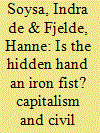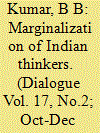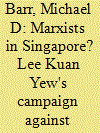| Srl | Item |
| 1 |
ID:
097767


|
|
|
|
|
| Publication |
2010.
|
| Summary/Abstract |
There is surprisingly little empirical scholarship on the spread of capitalistic economic policies under the rubric of 'globalization' and domestic peace. While the classical liberals saw free markets leading to social harmony because of self-interest of individuals, who cooperate for profit, Marxists and others viewed markets as anarchical, requiring state intervention for obtaining justice and peace. The authors argue from an opportunity-cost perspective that the payoffs to rebellion are structured by how an economy is governed. Closed economies are likelier than more open ones to accumulate 'rebellion specific capital' because of high payoffs to organization in the shadows. Using an index of economic freedom that measures how free people are to transact in an economy, the authors find that countries more favorable to free enterprise have a reduced risk of civil war onsets, a result that is robust to the inclusion of institutional quality, per capita wealth, and sundry controls. The results hold up despite a battery of specification changes, alternative data, and testing methods. The findings do not suggest that states under conditions of capitalism lose their autonomy to provide the public good of peace, as skeptics of globalization claim. Peacemakers will do well to build institutions that reward productive investment over rent-seeking, alongside democratic institutions that ultimately gain their legitimacy on the back of good economic performance and well-functioning markets.
|
|
|
|
|
|
|
|
|
|
|
|
|
|
|
|
| 2 |
ID:
142366


|
|
|
| 3 |
ID:
098396


|
|
|
|
|
| Publication |
2010.
|
| Summary/Abstract |
Singapore's ruling elite runs a finely calibrated system of social and political control based on a mixture of monitoring and repression by the state, and self-monitoring and self-restraint by all elements of civil society. This system matured under Goh Chok Tong's premiership in the 1990s but its template was created by Prime Minister Lee Kuan Yew in the final years of his premiership with his handling of a fresh upsurge of social justice activism and dissent that was becoming increasingly brave. In response to these challenges he created a fanciful narrative about a "Marxist conspiracy" to overthrow the state and centered the main force of his allegations on a group of activists who were associated with the local Catholic Church. He accused them of being Marxists who had been subverted by the teachings of liberation theology and used the Internal Security Act to detain them and destroy their rather modest and innocent operations; their treatment provided both an exemplar to other groups and a model for the next generation of the ruling elite to follow. This article uses archival, oral, and secondary sources to build an account of these events with a particular focus on the motivations and activities of this group of Catholics and the motivations of the government-which essentially means the motivations of Lee Kuan Yew.
|
|
|
|
|
|
|
|
|
|
|
|
|
|
|
|